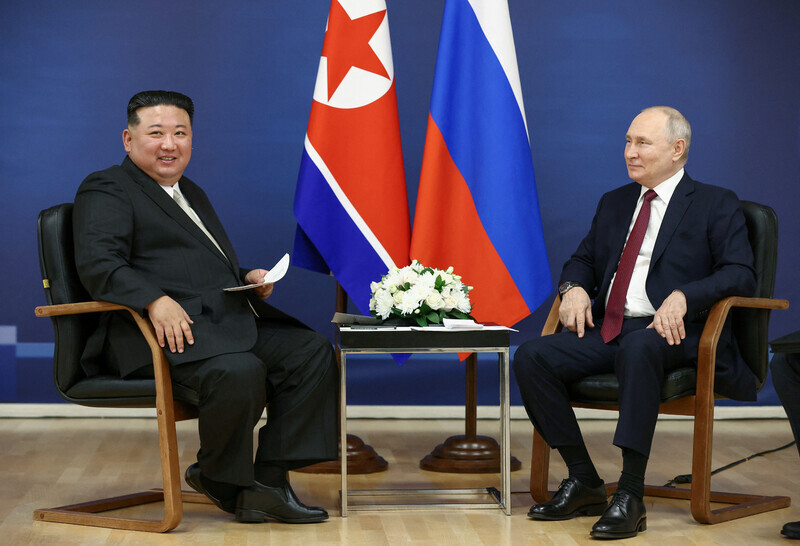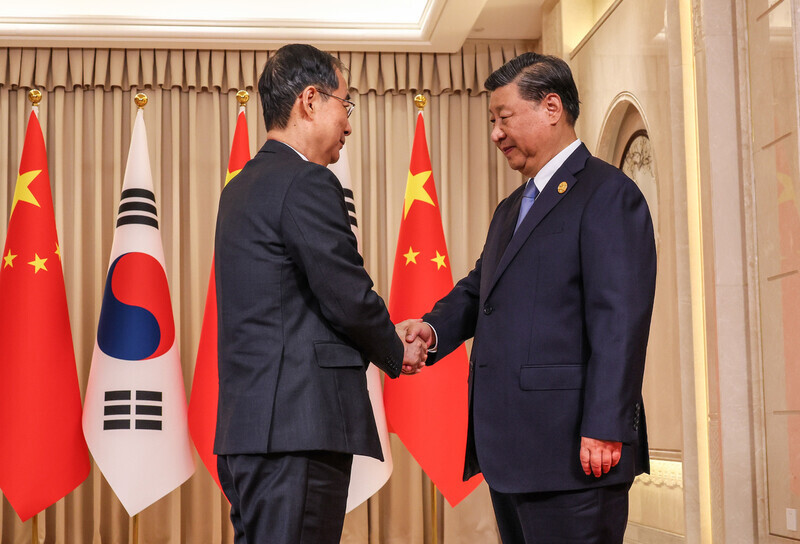hankyoreh
Links to other country sites 다른 나라 사이트 링크
[Column] Seoul’s relationship with Beijing takes on new weight amid cozying Pyongyang-Moscow ties


North Korean leader Kim Jong-un’s personal letter to then-US President Donald Trump, which was described as sounding like that written by a “disappointed friend or lover” by renowned US journalist Bob Woodward in his 2020 book “Rage,” was written on Aug. 5, 2019. In it, Kim expressed his strong displeasure regarding the South Korea-US joint command post exercise that was slated to take place six days later on Aug. 11, stressing again and again how upset he was. The shocking resumption of joint military drills between South Korea and the US that August, which came after the “no-deal” summit between North Korea and the US in Hanoi six months earlier in February, virtually broke down dialogue between Pyongyang and Washington.
How things have been on the Korean Peninsula ever since doesn’t require a lengthy explanation. After declaring that its confrontation with the US was bound to drag on, North Korea set off to strengthen its nuclear armament, speeding up its development of five different types of strategic weapons.
And on Sept. 13, roughly four years after his final letter, Kim embarked on a dangerous gamble that made the world hold its breath by holding a summit with Russian President Vladimir Putin, who has become public enemy No. 1 of the international community helmed by the US and Europe following Russia’s invasion of Ukraine.
In an essay published in Foreign Policy on Sept. 12, Siegfried Hecker, a longtime observer of North Korea, characterized Kim’s overture toward Russia as “neither tactical nor desperate” but a “result of a fundamental shift in North Korean policy, finally abandoning a 30-year effort to normalize relations with the US.” As if to demonstrate this point, Kim promised Putin and the Russian government “full and unconditional support,” adding, “We affirm that we will always stand with Russia.”
What should South Korea’s next move be? As the details of the agreement made between North Korea and Russia have not been made public, various opinions are being put forth. Progressives say that “North Korea has emerged as a formidable actor on the international stage” (Cheong Wook-sik, director of the Hankyoreh Peace Institute) and are demanding that the Yoon Suk-yeol administration should “course-correct” its diplomacy, which is oriented toward blindly following the US and uncritically antagonizing North Korea (Park Noja, professor at the University of Oslo).
In contrast, conservatives are propounding the radical notion that Seoul’s principle against providing lethal weapons to Ukraine should be reconsidered, and scrapping both the Sept. 19 Pyongyang Declaration and the Joint Declaration of the Denuclearization of the Korean Peninsula should seriously be contemplated (Lee Yong-joon, chairperson of the Sejong Institute).
While the proposals from progressives seem to have a more cool-headed grasp on today’s international affairs, the Yoon administration will not accept them. Still, putting to practice conservatives’ suggestion to send weapons to Ukraine would also be difficult. Objectively, the tactical and strategic cooperation that Pyongyang and Moscow will carry out moving forward has become a painful diplomatic constant that Seoul can’t really do anything with.
Strengthening cooperation with China is the only way to minimize the damage. Fortunately, China is keeping its distance from North Korea and Russia as they have been drawing closer in recent times. While meeting with Russian Foreign Minister Sergei Lavrov on Sept. 20, Chinese Foreign Minister Wang Yi was summarized as pointing out that “as major countries in the world and permanent members of the UN Security Council, China and Russia bear important responsibilities for maintaining global strategic stability and promoting world development and progress.” This remark can be interpreted as a demand for Russia to act responsibly after the country mentioned the possibility of providing satellite technology to North Korea.

During his meeting with South Korean Prime Minister Han Duck-soo, Chinese President Xi Jinping also stated that Beijing would maintain a policy of “good-neighborliness and friendship toward South Korea,” conveying his intent not to come together with Pyongyang and Moscow in relatively straightforward language.
Since the beginning of his presidency, Yoon has focused on bolstering trilateral cooperation among South Korea, the US and Japan while locking horns with China. During an interview with Reuters in April, Yoon made a statement seemingly brushing aside Beijing’s valued “one China” principle, pushing South Korea-China relations to the brink of breakdown. Closening ties between North Korea and Russia should be considered a seismic shift in geopolitics that unsettles regional affairs. Hence, maintaining the stability of South Korea-China relations has become an even more vital interest for Seoul than before.
Moreover, the outcome of next year’s presidential election in the US is hard to anticipate. South Korea shouldn’t stick its neck out across the battlefront of strategic competition between the US and China like a reckless rifleman. Yoon may go down in history as a figure who ruined South Korean diplomacy if he misreads the cards and destroys relations with China once again.
Please direct questions or comments to [english@hani.co.kr]

Editorial・opinion
![[Column] Season 2 of special prosecutor probe may be coming to Korea soon [Column] Season 2 of special prosecutor probe may be coming to Korea soon](https://flexible.img.hani.co.kr/flexible/normal/500/300/imgdb/original/2024/0426/3317141030699447.jpg) [Column] Season 2 of special prosecutor probe may be coming to Korea soon
[Column] Season 2 of special prosecutor probe may be coming to Korea soon![[Column] Park Geun-hye déjà vu in Yoon Suk-yeol [Column] Park Geun-hye déjà vu in Yoon Suk-yeol](https://flexible.img.hani.co.kr/flexible/normal/500/300/imgdb/original/2024/0424/651713945113788.jpg) [Column] Park Geun-hye déjà vu in Yoon Suk-yeol
[Column] Park Geun-hye déjà vu in Yoon Suk-yeol- [Editorial] New weight of N. Korea’s nuclear threats makes dialogue all the more urgent
- [Guest essay] The real reason Korea’s new right wants to dub Rhee a founding father
- [Column] ‘Choson’: Is it time we start referring to N. Korea in its own terms?
- [Editorial] Japan’s rewriting of history with Korea has gone too far
- [Column] The president’s questionable capacity for dialogue
- [Column] Are chaebol firms just pizza pies for families to divvy up as they please?
- [Column] Has Korea, too, crossed the Rubicon on China?
- [Correspondent’s column] In Japan’s alliance with US, echoes of its past alliances with UK
Most viewed articles
- 1After election rout, Yoon’s left with 3 choices for dealing with the opposition
- 2AI is catching up with humans at a ‘shocking’ rate
- 3Noting shared ‘values,’ Korea hints at passport-free travel with Japan
- 4Why Kim Jong-un is scrapping the term ‘Day of the Sun’ and toning down fanfare for predecessors
- 5Two factors that’ll decide if Korea’s economy keeps on its upward trend
- 6South Korea officially an aged society just 17 years after becoming aging society
- 7Korea’s 1.3% growth in Q1 signals ‘textbook’ return to growth, says government
- 8Is Japan about to snatch control of Line messenger from Korea’s Naver?
- 91 in 5 unwed Korean women want child-free life, study shows
- 10[Reportage] On US campuses, student risk arrest as they call for divestment from Israel